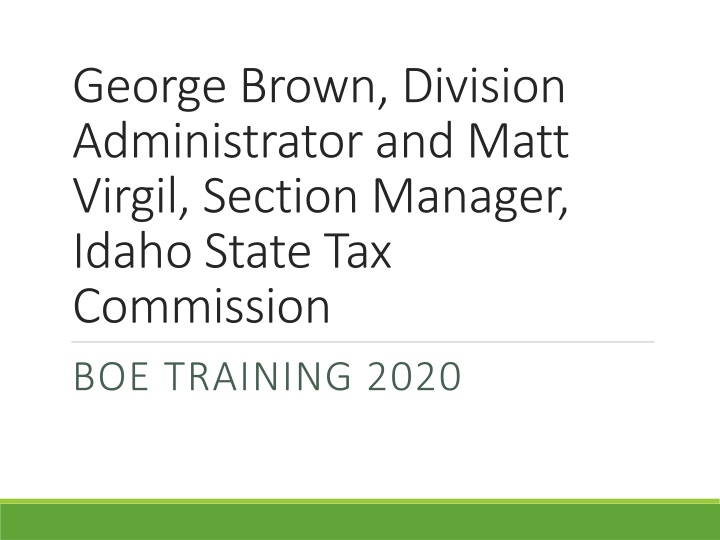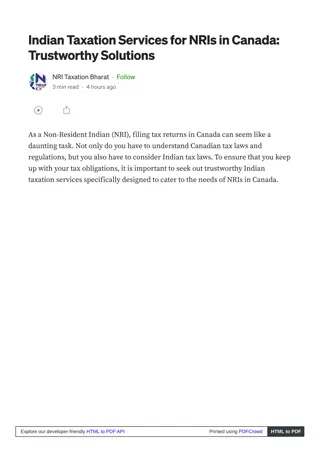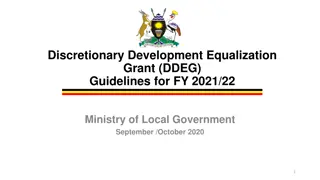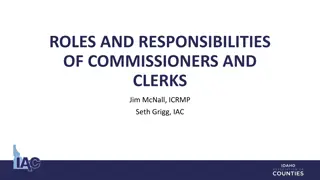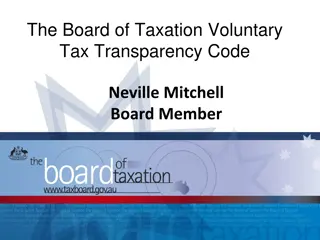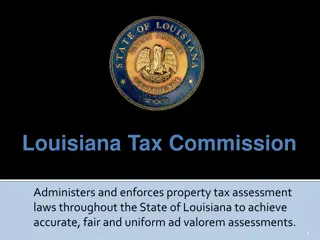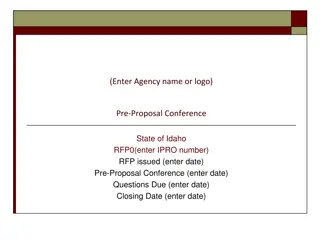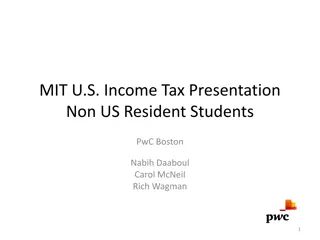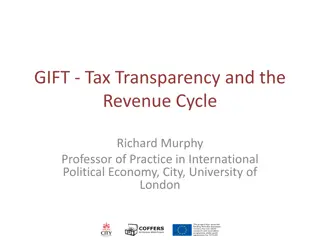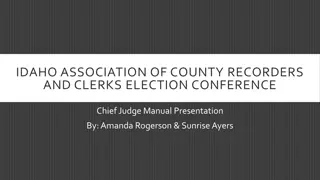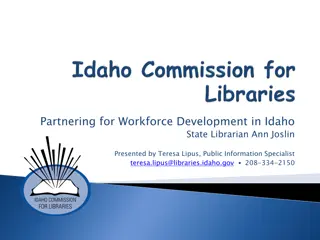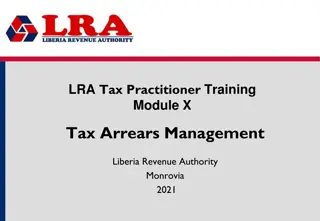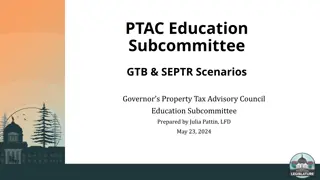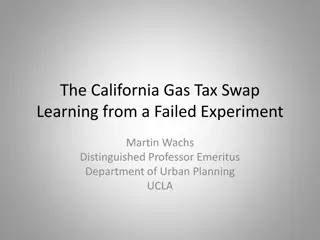Idaho State Tax Commission Board of Equalization Procedures
The Idaho State Tax Commission Board of Equalization Procedures Manual provides guidance to county commissioners on carrying out their responsibilities for property assessment and taxation. The manual aims to ensure consistency in the Board of Equalization process statewide, focusing on achieving market value for property assessment purposes. It outlines the duties and powers of the State Tax Commission, county assessors, and Boards of Equalization to enforce uniformity in property assessment and taxation as required by law. The manual also emphasizes the importance of education and training programs for employees, commissioners, and assessors to maintain standards in property assessment practices.
Download Presentation

Please find below an Image/Link to download the presentation.
The content on the website is provided AS IS for your information and personal use only. It may not be sold, licensed, or shared on other websites without obtaining consent from the author.If you encounter any issues during the download, it is possible that the publisher has removed the file from their server.
You are allowed to download the files provided on this website for personal or commercial use, subject to the condition that they are used lawfully. All files are the property of their respective owners.
The content on the website is provided AS IS for your information and personal use only. It may not be sold, licensed, or shared on other websites without obtaining consent from the author.
E N D
Presentation Transcript
George Brown, Division Administrator and Matt Virgil, Section Manager, Idaho State Tax Commission BOE TRAINING 2020
PROPERTY TAX DIVISION Tom Katsilometes Commissioner George Brown Division Administrator Jeff Middleton Jerott Rudd Alan Dornfest Matt Virgil Janet James Bureau Chief Operating Property Tax Policy Bureau Chief Education Director Section Manager Technical Support
Board of Equalization Board of Equalization Procedures Manual Procedures Manual OCTOBER 2014
INTRODUCTION The Idaho Association of Counties Board of Directors developed this manual to provide assistance to county commissioners in carrying out their constitutional and statutory responsibilities and to ensure consistency in the Board of Equalization (BOE) process statewide. This manual is designed to provide a practical framework for the Board of Equalization process to achieve market value.
INTRODUCTION The function of the Board of Equalization shall be confined strictly to assuring that the market value for assessment purposes of property has been found by the assessor. . . It is hereby made the duty of the Board of Equalization to enforce and compel a proper classification and assessment of all property. . . . [Emphasis added.]
INTRODUCTION The State Tax Commission shall have the power and duty: To instruct, guide, direct and assist the county assessors and county Boards of Equalization as to the methods best calculated to secure uniformity in the assessment and equalization of property taxes, to the end that all property shall be assessed and taxed as required by law. [Idaho Code Section 63- 105A (6)]
INTRODUCTION (continued) To provide a program of education and an annual appraisal school for its employees, for county commissioners and for the assessors of the various counties of this state. [Idaho Code Section 63-105A (17)] House Bill 826: 1998 Session
INTRODUCTION (continued) Understanding the format of this manual will assist you in its use. Where possible, the Idaho Code is cited by title number and section. If questions arise concerning interpretation of the Idaho Code or this manual, always consult your prosecuting attorney.
IDAHO OPEN MEETING LAW . . .All meetings of a governing body of a public agency shall be open to the public and all persons shall be permitted to attend any meeting except as otherwise provided by this act. No decision at a meeting of a governing body of a public agency shall be made by secret ballot. [Idaho Code Section 67-2342(1)] See APPENDIX G
COUNTY ASSESSMENT PROCESS Mass appraisal techniques require the Assessor to consider all of the market data (Sales, Income & Cost) by property type in the jurisdiction. The single property appraiser may only consider Sales, Income and Cost data from three or four properties.
APPRAISAL DATE In Idaho, all property is assessed annually as of 12:01 A.M., on the first of January, in the year in which the taxes are levied. For example, the appraisal date for the 2020 assessment year would be 12:01 A.M., January 1, 2020. An appraisal for property tax purposes should reflect a property's value as of the lien date (January 1). ( 63-205 and 63-206, Idaho Code, I.C.)
COUNTY ASSESSMENT PROCESS This assessment is presumed correct unless the taxpayer proves, by the preponderance of the evidence, that the assessor s value is erroneous. [Idaho Code Section 63-502]
ASSESSMENT ROLLS Property roll All real and personal property subject to assessment on January 1 must be included in the property roll that must be submitted to the Board of Equalization on or before the fourth Monday of June. [Idaho Code Section 63-310]
ASSESSMENT ROLLS Subsequent property roll All property subject to assessment after the fourth Monday of June is included on the subsequent property roll and must be submitted to the Board of Equalization on or before the fourth Monday of November. [Idaho Code Sections 63-311 and 63-501]
ASSESSMENT ROLLS Missed property roll All property subject to assessment after the fourth Monday in November is included on the missed property roll and must be submitted to the Board of Equalization by the first Monday of January. [Idaho Code Sections 63-311 and 63-501]
ASSESSMENT ROLLS Occupancy Roll Depending on when the assessment notice is sent, the hearing may be held during the same time as those for the Missed Property Roll or may need to be heard no sooner than the first meeting in January. Idaho Code Section 63-501(2)(c)
ASSESSMENT NOTICE For the real and personal property roll, the Assessor must have sent each property owner a notice of assessment by the first Monday in June. The valuation assessment notice mailed or delivered must contain notices of all meetings of the Board of Equalization for the purposes of equalizing assessments of property and for granting exemptions from taxation.
CORRECTED ASSESSMENT NOTICE If the Assessor discovers that an error has been made on an assessment between the first and fourth Monday of June, a new assessment notice must be sent to the property owner showing the corrected assessment in time for the property owner to file an appeal with the Board of Equalization on or before the fourth Monday in June.
CORRECTED ASSESSMENT NOTICE Once the roll is in the possession of the Board of Equalization, the assessor cannot make a change without an order from the Board. The Assessor can petition the Board to order the correction to be made. In this case, a notice in the form of a letter should be sent to the property owner and would invoke the provisions of Idaho Code Section 63-506.
ASSESSMENT NOTICE FOR THE SUBSEQUENT PROPERTY ROLL For property entered and assessed on the subsequent property roll, the valuation assessment notice shall be delivered to the property owner, his agent or representative, or mailed to the property owner, his agent or representative at his last known post office address as soon as possible after it is prepared, but not later than the fourth Monday in November. [Idaho Code Section 63-311]
ASSESSMENT NOTICEFORTHE MISSED PROPERTY ROLL For property entered and assessed on the missed property roll, the valuation assessment notice shall be delivered to the property owner, his agent or representative, or mailed to the property owner, his agent or representative at his last known post office address as soon as possible after it is prepared, but not later than the first Monday of January of the following year. [Idaho Code Section 63-311]
APPEALS PROCESS Property owners may file an appeal of an assessment with the Board of Equalization. If a property owner wishes to appeal an assessment, the appeal must be filed with the Board of Equalization on or before the close of business on the fourth Monday in June for the real and personal property roll, the fourth Monday in November for the subsequent property roll, and anytime up to the adjournment of the BOE Meeting in January for the missed property roll. [Idaho Code Section 63-501A]
REASONS FOR APPEAL PROPERTYOWNER S PERSPECTIVE: From the property owner s perspective, appeals of property valuations are a matter of economics. In many cases, the property owner thinks the appeal is about taxes and not the value of property.
REASONS FOR APPEAL ASSESSOR S PERSPECTIVE: The Assessor is most concerned about equity and fairness and is generally willing to correct an error in a valuation pointed out by the property owner or Board of Equalization. The Assessor is, however, concerned with decisions made by the Board of Equalization that may cause an inequity between property owners who own similar property.
BOARD OF EQUALIZATION MEETINGS Idaho Code 63-501 At least once per month to the fourth Monday of June. Daily from the fourth Monday of June to the Second Monday in July. The fourth Monday in November (Subsequent Property Roll.) Business on Subsequent Roll to be completed by first Monday in December.
APPEALOFTHE PROPERTY ROLL Appeal hearings can be held via phone conversation or from letters that have been submitted. If a property owner files an appeal but fails to appear for the hearing, the Board of Equalization should consult the Prosecuting Attorney regarding how to proceed.
EXTENSION OF THE BOARD OF EQUALIZATION Requests toextend theBOE are made via written request transmitted by facsimile or email to the commissioner of the State Tax Commission in charge of property tax.
EXTENSION OF THE BOARD OF EQUALIZATION When the Tax Commission deems necessary, it may require the BOE to reconvene for equalization purposes and for correction of errors. If required to reconvene, the BOE shall have no power to conduct other business except for that which it is specifically reconvened. [Idaho Code Section 63-105A(7)]
SCHEDULING THE APPEALS The greatest reason for scheduling hearings is to minimize the appellant s and the assessor/appraiser s time at a hearing. You should consider any appellant s request to group parcels that they own into a single or sequential hearing time. If an appellant has multiple parcels with a similar issue, they would only have to appear before the Board once.
SCHEDULING THE APPEALS Consideration should be given for scheduling residential and commercial parcels into separate times and/or days. Mixing the two parcel types can cause schedule creep as commercial properties can sometimes be quite complex and complicated to hear. It is best to schedule residential and commercial parcels separately.
THE PLAYERS IN THE HEARING The Property Owner (Appellant) Most appellants are property owners who appeal their own assessment. However, any property owner can appeal any assessment. It is possible for a taxpayer to appeal his neighbor s property value if he or she thinks the neighbor s property value is incorrect. [Idaho Code Section 63-501A]
THE PLAYERS IN THE HEARING TheAssessor (Respondent) The respondent is usually the Assessor. The Assessor may be represented by a deputy or appraiser from the Assessor s office. The Assessor or designee shall attend all meetings of the Board of Equalization. The BOE, however, may require the Assessor to be present in the hearing when necessary. [Idaho Code Section 63-505]
THE PLAYERS IN THE HEARING Expert and Fact Witnesses (County Appraisers or Appellant s Appraisers) The property owner and the Assessor may have invited expert or fact witnesses to testify in their behalf. An expert witness is one that is asked to render a professional opinion, while a fact witness can only testify to a known fact.
THE PLAYERS IN THE HEARING (continued)In an ad valorem case the fact witness can testify that the property has a lake view (a known fact); while the expert witness can offer an opinion that the value of the property increases $30,000 because of that view (a professional opinion).Testimony from fact and expert witnesses provide their testimony in the time that you have designated for the property owner and the Assessor.
THE PLAYERS IN THE HEARING Legal Counsel for the County The Board of Equalization can have the Prosecuting Attorney or a deputy attend the Board of Equalization hearings. The Prosecuting Attorney is there only to provide legal advice to the BOE. Consider use in simple vs. complex appeals.
THE PLAYERS IN THE HEARING Legal Counsel for the Property Owner Typically the only time the property owner is represented by an attorney is when the assessment under appeal is of a complex commercial or industrial property.
THE PLAYERS IN THE HEARING The County Clerk The County Clerk or a deputy must attend all Board of Equalization hearings. The Clerk must record the official minutes and all proceedings of the BOE. Therefore, it is recommended the hearings be electronically recorded. [Idaho Code Section 63-507]
THE PLAYERS IN THE HEARING The Commissioners Since the Board of County Commissioners sits as the Board of Equalization, the Chairman of the Board of County Commissioners is also the Chairman of the Board of Equalization. It cannot be overemphasized that the Chairman shall maintain control of the hearing and shall state and follow the rules of the hearing.
HEARING RULES The Board of Equalization and Clerk should develop a document explaining the hearing process and the hearing rules that shall be given to each property owner when they pick up their appeals form from the Clerk. (See Sample in Appendix B of the Manual) Both the property owner and Assessor will be better prepared if they know what is expected from them before the hearing starts.
HEARING RULES The amount of time for direct testimony: The property owner and the Assessor should both be held to a set time to present their direct testimony. The amount of time can change depending on the complexity of the appeal. For a single family residence, both sides can probably present their case in 10 minutes or less. For a complex commercial or industrial property it may take 20 to 30 minutes.
HEARING RULES The amount of time for questions: After the property owner or Assessor has presented their cases, the other side should be allowed to ask questions. Questions should be asked only for the purpose of clarifying issues for the Board, and not for in-depth cross examination. The time allowed for questions should be no more than 5 to 10 minutes depending on the complexity of the valuation under appeal.
HEARING RULES (continued) The Board of Equalization can ask questions at any time for the purpose of clarifying issues, but should be careful not to use that time to render an opinion supporting either side. No opinion should be expressed on any testimony until deliberation by the BOE.
HEARING RULES The amount of time for rebuttal: Both sides should be afforded an opportunity for a short rebuttal. The BOE should allow short rebuttal starting with the property owner. Again the time allowed for rebuttal should be held to a few minutes for both sides. The rebuttal is typically used to address points made by the other side or to restate the significant points of the appeal.
HEARING RULES Written testimony and exhibits: The property owner as appellant and the Assessor as respondent should be allowed or even encouraged to present written testimony and exhibits. Both sides should have enough copies of their exhibits for all three members of the BOE, the Clerk, and the other side. All copies should be made prior to the hearing.
HEARING RULES (continued) Exhibits may be submitted by each side prior to the hearing or as testimony is given. All exhibits should be clearly marked as appellant or respondents exhibits. The exhibits are a part of the official record kept by the clerk.
ORDER OF THE HEARING Close BOCC and Open BOE Review the Rules for the Hearing Swear in all those who plan to testify (Recommended) The Property Owner Presents Testimony First The Assessor, Assessor s Designee or Prosecuting Attorney asks Questions
ORDER OF THE HEARING (continued) The Assessor Presents Testimony The Property Owner asks Questions Rebuttal from Each Side Decision on the Case
DECISION MAKING PROCESS The Board of Equalization is charged to do nothing more than assure the market value established by the Assessor is correct. The purpose of the appeals hearing is not to NEGOTIATE, COMPROMISE OR MEDIATE. [Idaho Code Sections 63-501 and 63-502].
DECISION MAKING PROCESS A greater inequity may result if the BOE changes a property owner s value and makes it unequal with like properties in the same area. It may be that the decision of the Board of Equalization may cover an entire subdivision or property type.
PREPONDERANCE OF EVIDENCE Idaho Code Section 63-502 states in part that the preponderance of the evidence shall suffice to sustain the burden of proof . This is the weight of the evidence required in a Board of Equalization hearing to decide in favor of the Assessor or the property owner. This preponderance is based on the more convincing evidence and its probable truth or accuracy, and not on the amount of evidence.
